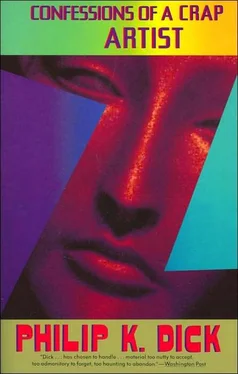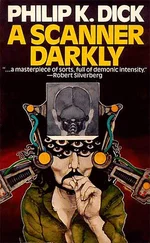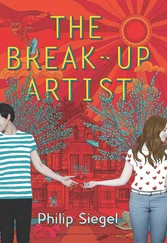The humor in the novel, in everything Dick says and writes, is self-evident (“I stood in the middle of my room doing absolutely nothing except respiring, and, of course, keeping other normal processes going”). Dick writes from the center of some vast despair that is, however, never final; the reverse of cynicism is at work here. No matter how miserable and absurd his characters’ actions and thoughts are, Dick’s attitude toward his characters is always, finally, sympathetic—he loves and understands them, his books affirm a faith and affection for humanity, in spite of all our idiocies. The result is somehow comic. In Confessions particularly, every little hilarious detail of the awful vanity of our minds is mercilessly exposed. It is possible a woman could drive a man to such a state that he would assassinate his own pet theep? You better believe it.
But the humor in no way dilutes the horror. The horror in all of Dick’s novels is that the world around us is cruel and insane, and the more courageously we struggle to remove the blinders from our eyes and see things as they really are, the more we suffer. Awareness is pain; and Dick’s characters are cursed with awareness, like the autistic child in Martian Time-Slip who hears the noise of the universe decaying. In Confessions of a Crap-Artist , the horror is that human beings torture each other, and fail repeatedly to do what is best both for the people around them and for themselves. We are dimly—sometimes even acutely—aware of the interconnectedness of our lives, but we don’t seem to be able to put that awareness to work for us, in fact our efforts to do so only make things worse. The novel is summed up in Jack Isidore’s poignant observation: “In fact, the whole world is full of nuts. It’s enough to get you down.”
Here are Philip K. Dick’s thoughts on Confessions of a Crap Artist , from a letter dated January 19, 1975:
When I wrote Confessions I had the idea of creating the most idiotic protagonist, ignorant and without common sense, a walking symposium of nitwit beliefs and opinions… an outcast from our society, a totally marginal man who sees everything from the outside only and hence must guess as to what’s going on.
In the Dark Ages there was an Isidore of Seville, Spain, who wrote an encyclopedia, the shortest ever written: about thirty-five pages, as I recall. I hadn’t realized how ignorant they were then until I realized that Isidore of Seville’s encyclopedia was considered a masterpiece of educated compilations for a hell of a long time.
It came to me, then, back in the ‘50’s, to wonder, What if I created a modern-day Isidore, this one of Seville, California, and had him sort of write something for our time like that of Isidore of Seville, Spain? What would be the analog? Obviously, a schizoid person, a loner, like my protagonist. But underneath, most important of all, I wanted to show that this ignorant outsider was a man, too, like we are; he has the same heart as we, and sometimes is a good person.
In reading the novel over now, I am amazed to find that I agree even more that Jack Isidore of Seville, California, is no dummy; I am amazed to see how, below the surface of gabble which he prattles constantly, he has a sort of shrewdly appraising subconscious which sees maybe very darkly into events, but shit—as I finished the novel this time I thought, to my surprise, Maybe ol’ Jack Isidore is right! Maybe he doesn’t just see as well aswe do, but in fact—incredibly, really—somehow and somewhat better.
In other words, I had sympathy for him when I wrote it back in the ‘50s, but now I have I think even more sympathy, as if time has begun to vindicate Jack Isidore. His painfully-arrived-at opinions are in some strange, beautiful way lacking in the preconceptions which tell the rest of us what must be true and what must not be, come hell or high water. Jack Isidore starts with no preconceptions, takes his information from wherever he can find it, and winds up with bizarre but curiously authentic conclusions. Like an observer from another planet entirely, he is a kind of gutter sociologist among us. I like him; I approve of him. I wonder, another twenty years from now, if his opinions may not seem even more right on. He is, in many ways, a superior person.
At the end, for instance, when he realizes he was wrong, that the world is not going to end, he is able to survive this extraordinary (for him) realization; he adjusts. I wonder if we could do as well if we learned that he was right, and we were wrong. But perhaps most important of all, as Jack himself observed, didn’t we see all the normal human beings, the sane and educated and balanced ones, destroy themselves in truly dreadful ways? And see Jack steer clear, throughout, of virtually all moral wrongdoing? If his common sense, his practical judgment as to what is, and as to what he can or can’t do, is fucked, what about his refusal to be led into criminal and evil acts? He stays free; from a realistic standpoint he is doomed and damned, but from a moral one, a spiritual one if you will, he winds up untarnished… and it is certainly his victory, and a measure of his shrewd judgment, that he realizes this and points it out.
So Jack has insight into himself and the world around him to an enormous degree. He is no dummy. From a purely survival standpoint, maybe he will—and ought to—make it. Maybe, like the Emperor Claudius of Rome, like “The Idiot,” he is one of God’s favored fools; maybe he is an authentic avatar of Parsifal, the guileless fool of the medieval legends… if so, we can use him, and a lot more like him.
This forgiving man, capable of evaluating without prejudice (in the final analysis) the hearts and actions of his fellow men, is to me a sort of romantic hero; I certainly had myself in mind when I wrote it, and now, after reading it again so many years later, I am pleased at my inner model, my alter self, Jack Isidore of Seville, California: more selfless than I am, more kind, and in a deep deep way a better man.
Confessions of a Crap Artist is, in Phil Dick’s opinion, easily the finest of his non-science fiction novels, and one of the best books he has ever written (ranking, in the undersigned’s opinion, with Dick’s Hugo-Award-winning The Man In The High Castle and his equally brilliant Martian Time-Slip ). It is also, I think, one of the most penetrating novels anyone has written about life in America in the midtwentieth century.
Philip K. Dick was living in Point Reyes, California, when he wrote this novel, Shortly after completing it, he married the woman who had inspired him to create Fay Hume, and they lived together for the next five years.
New York City,
February, 1975
I am made out of water. You wouldn’t know it, because I have it bound in. My friends are made out of water, too. All of them. The problem for us is that not only do we have to walk around without being absorbed by the ground but we also have to earn our livings.
Actually there’s even a greater problem. We don’t feel at home anywhere we go. Why is that?
The answer is World War Two.
World War Two began on December 7, 1941. In those days I was sixteen years old and going to Seville High. As soon as I heard the news on the radio I realized that I was going to be in it, that our president had his opportunity now to whip the Japs and the Germans, and that it would take all of us pulling shoulder to shoulder. The radio was one I built myself. I was always putting together superhet five-tube ac-dc receivers. My room was overflowing with earphones and coils and condensers, along with plenty of other technical equipment.
The radio announcement interrupted a bread commercial that went:
Читать дальше










